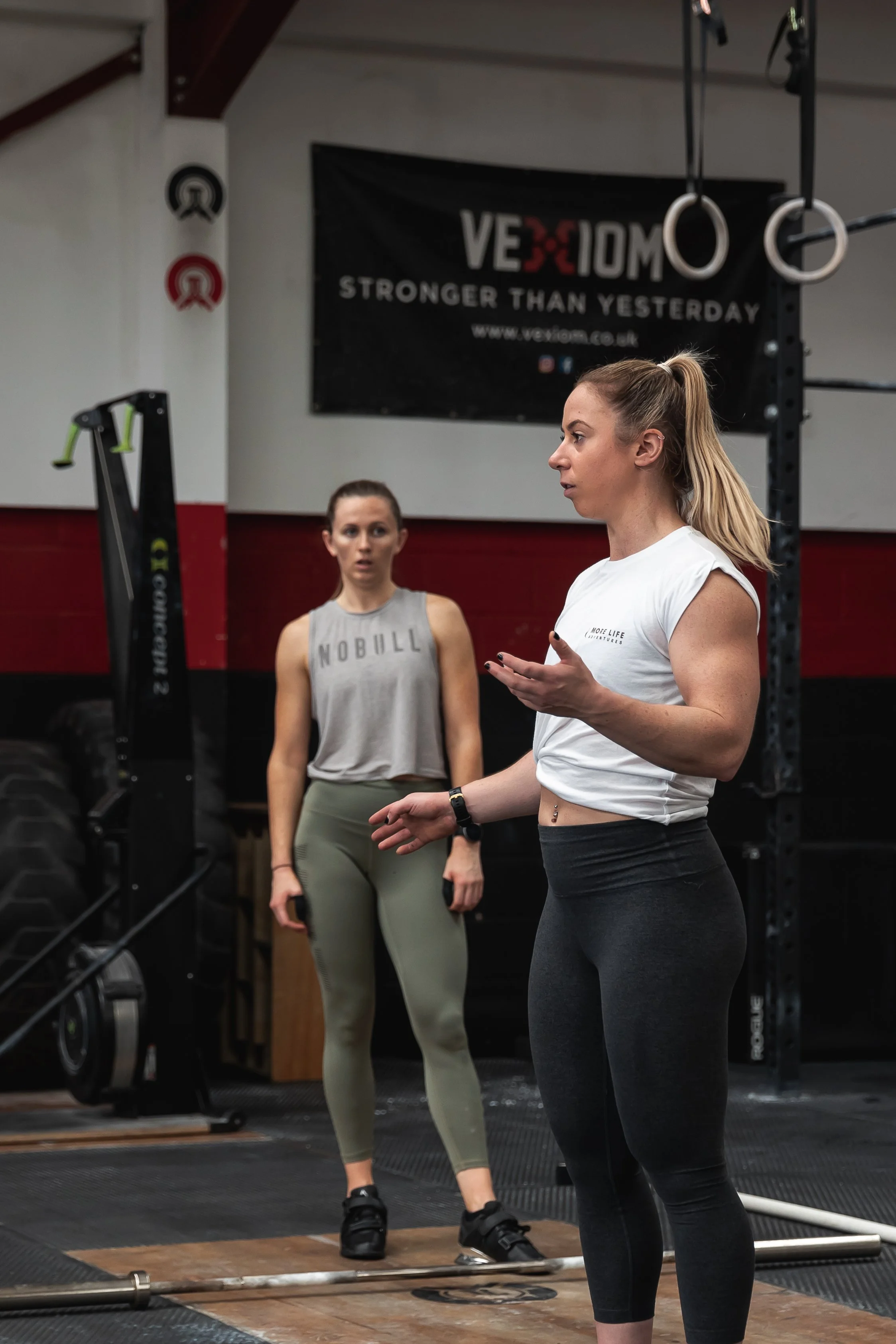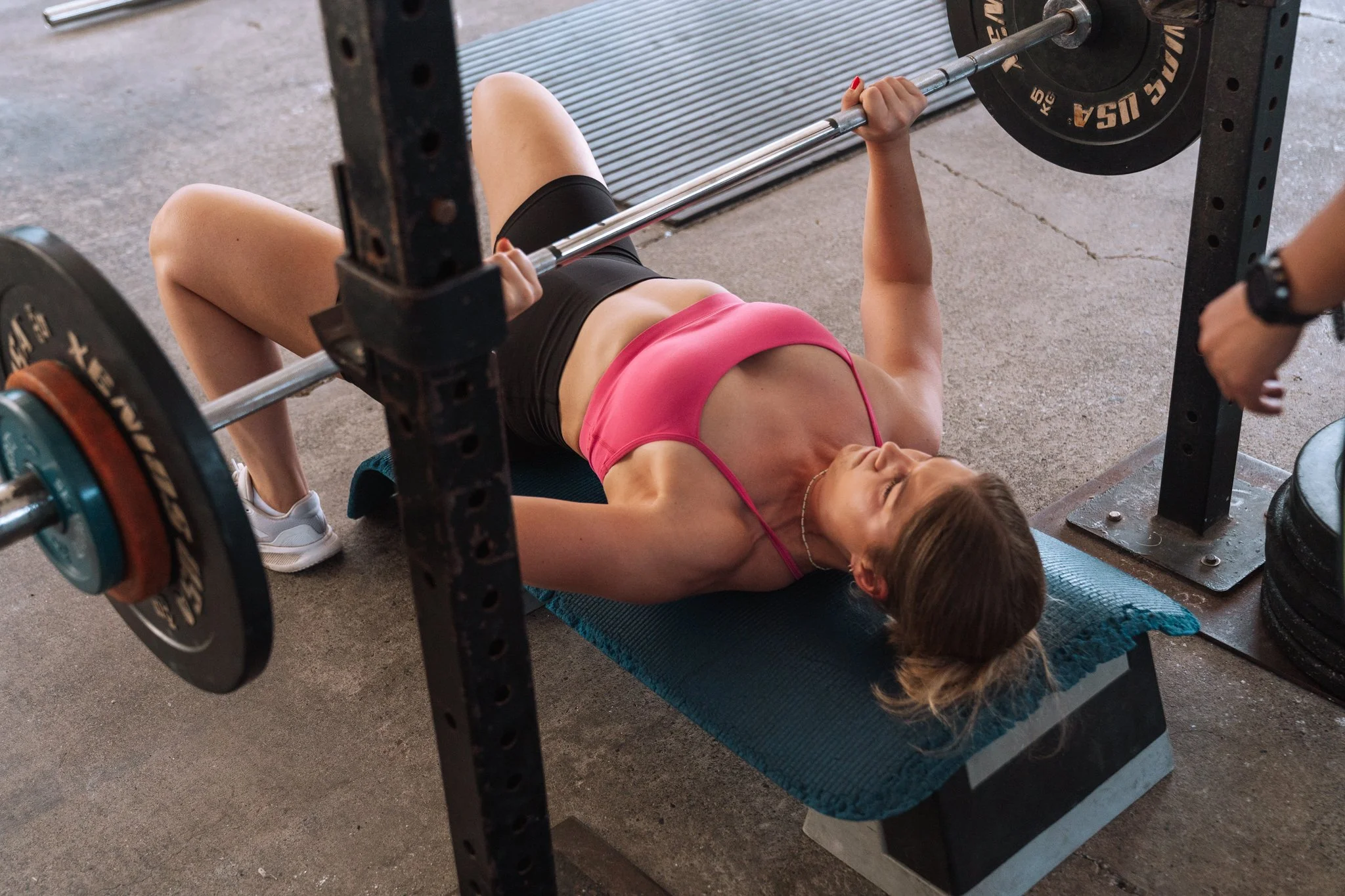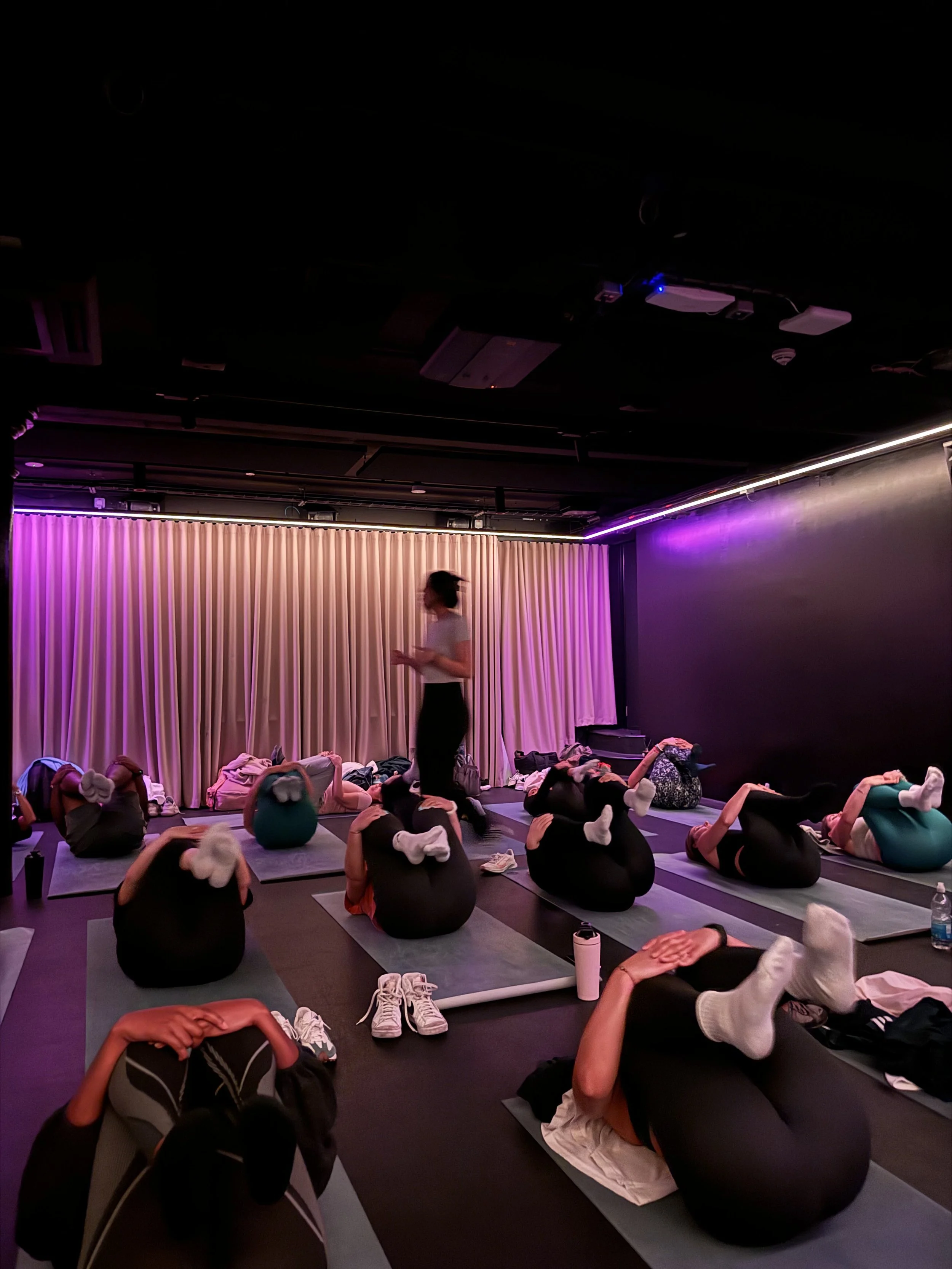The Six Things Every Woman Should Know About Strength Training In Perimenopause
With the team at Hatch Athletic
Perimenopause and menopause can feel overwhelming. You might be noticing your body doesn’t respond to training the same way it used to. You might feel more tired, less motivated, or unsure about whether your workouts are helping or hindering your progress. Or, you might not feel dramatically different yet still find yourself confused at the endless amount of messaging and products online that surround the topic.
The good news is – this chapter is simply another chapter in which you can feel strong, powerful and energised. In fact, with the right approach, it can be the beginning of an even more aligned and sustainable way to train.
We spoke with the women’s health experts at Hatch Athletic – a team that blends elite physiotherapy, evidence-based programming, and lived experience – to understand what really matters when it comes to training through your 30s, 40s, 50s, and beyond.
Here are six things every woman should know:
1. You Can’t Out-Train a Tired Nervous System
If your training feels harder than it used to, if you’re constantly sore, tired, or wondering why you’re not recovering like before, pay attention to it.
One of the most common patterns the Hatch team sees is women in their 30s, 40s, and 50s still following the same training model they used a decade ago. But the truth is: your body has changed, so your training needs to change too.
Stress, hormones, recovery capacity and sleep all shift during perimenopause and menopause. So it’s not about doing less for the sake of it, but rather about training with intention and meeting your body’s energy needs and demands. .
“I used to think rest days were lazy. Now I know they’re what made me stronger.” - Aoife Burke, Hatch Athletic Coach & Head of Programming
If you're tired all the time, waking up groggy, or feeling sluggish after workouts, it’s not a good idea to push through, which we’ve been conditioned to believe. Instead, it’s a signal to recalibrate, so add in more rest, increase your fuel intake, and listen to your body. You’re not failing by making these changes, you’re simply making the necessary adaptions to fit your life as it is now.
2. Lifting Weights Isn’t Optional. It’s Essential
You don’t need to stop running, hiking, or cycling, but if you want to keep doing those things long-term, you need to support your body with strength training.
This means building strength that protects your bones, joints, and pelvic floor, especially in the face of declining estrogen. This is why strength training during perimenopause and menopause becomes one of the most powerful tools women have for long‑term health.
“Endurance is play. But you’ve got to train to be able to play.” - Kat Suchet, Founder of Hatch Athletic
Whilst strength training can seem intimidating if you haven’t ventured into the realm before, rest assured that there are many types of strength training you can do to still receive the many benefits. For example, you don’t have to start with barbells – dumbbells and kettlebells are enough to begin. The key is progression and stimulus. So if you want to keep doing the things you love through menopause and beyond, strength training is non-negotiable.
3. Yes, Your Training Response Will Change. And That’s Okay
You might notice that the workouts you loved don’t feel the same. Maybe your recovery takes longer, or maybe your energy crashes midweek. Hormonal shifts mean your recovery, energy, and progress might look different than they used to. This doesn’t mean you’re doing it wrong, it just means your body needs something different. This is why choosing the right workouts for menopause matters — not all training styles support the body equally during this transition.
“The biggest mistake we see? Women trying to train the same way in their 40s as they did in their 20s without adjusting for the hormonal picture, recovery demands, and lifestyle context.” - Kat Suchet
If you keep training the same way without adjusting, you’ll likely hit a wall.
Hatch recommends a smarter approach:
2–3 strength sessions per week using heavy, low-rep lifts (4–6 sets of 2–6 reps)
Accessory work in the 6–12 rep range
1 HIIT session and 1 sprint interval session per week
Skills, core work, and mobility to complement big lifts
Prioritising rest days (which absolutely count as part of your training)
This kind of structured weight training during menopause helps support energy, recovery, and long‑term performance. Training smarter and following a set programme designed for your current needs not only means you’ll meet your body where it’s at, but also that you’ll be able to train for much longer than if you try to push yourself through workouts that no longer serve you.
4. Training Isn’t Just About the Gym
Movement and fitness is just one part of the equation. But your hormones, your nutrition, your sleep, your gut health, and your nervous system all matter too.
That’s why Hatch’s programmes begin with two weeks of onboarding education that covers:
What’s happening with your hormones and why it matters
How to actually fuel recovery and training (spoiler: you probably need a lot more carbs than you think)
The importance of pelvic floor care, stress regulation, and rest
“We don’t just hand you a workout. We teach you what your body’s telling you.” - Kat Suchet
Hatch’s onboarding also helps you understand how menopause and exercise influence one another, so you can train in a way that supports your physiology. Rather than striving for perfection, the team at Hatch focuses on education and how you can understand your body and take appropriate action. Once you understand how your body works, you stop second-guessing yourself and start making choices that support your health, not fight against it.
5. It’s Never Too Late to Start Strength Training
If you’ve never picked up a dumbbell or barbell before, just know that a) you’re not the only one, and b) that doesn’t mean you’re behind. Weight lifting for menopause is most effective when it’s progressive –focusing on building strength through consistent, structured training that evolves over time.
Hatch’s approach meets you where you’re at, with introductory programmes using dumbbells and kettlebells, progressing toward barbell lifting when you’re ready.
Their FORM programme is uniquely designed for women who are seeking a functional fitness programme that supports their natural cycles and hormones. And the FLY programme is designed for active women who are 40+ and perimenopausal or postmenopausal, building strength and fitness both quickly and effectively whilst balancing the needs of menopausal changes.
“Start where you are. Build from there. Your future self will thank you.” - Kat Suchet
6. What You Do in Your 20s & 30s Matters More Than You Think
One of the best ways to support your performance, energy and resilience in your 40s and beyond is to start building strong habits earlier.
The Hatch team encourages women in their 20s and 30s to be aware of the long game when it comes to overall health and training, not just the short-term goal.
Here’s what that looks like in practice:
Track your cycle: You don’t need to obsess over it, but observe it and be aware of it. Your menstrual cycle is a window into your hormonal health, so knowing how you feel in different phases of your cycle helps you train, eat, and recover more intuitively.
Understand what’s happening in your body: If you're on hormonal contraception and curious about your natural cycle, consider coming off to learn what your baseline looks like. This is especially helpful for women at risk of RED-S (Relative Energy Deficiency in Sport) or low energy availability.
Eat more carbohydrates: Most active women are under-fuelling, especially around training. Carbs support performance, recovery, and hormonal balance, so are an essential part of your nutrition, and you often need much more than you think.
Take more rest days: If you’re always pushing hard, you may be doing more harm than good. Recovery is where your body adapts and gets stronger.
Balance your training load: Don’t pair a heavy lifting day with more heavy lifting the next day. Instead, include lighter skill sessions, accessory work, core work, or endurance. A variety in your training sessions can really support both your recovery and progress.
“If I’d known in my 20s what I know now, I would’ve fuelled more, lifted smarter, and given myself more rest. I thought being a good athlete meant staying small and going hard every day. Now I know that wasn’t sustainable.” - Kat Suchet
About Hatch Athletic
Hatch offers evidence-based training programmes, education and coaching certifications to support women across the full life cycle – from pregnancy and postpartum to hormone health, peri/menopause and beyond.
Click here to learn more about FORM – Hatch's performance programme for women who are not pregnant postpartum or heading into menopausal changes.
Click here to learn more about FLY – Hatch’s programme for peri and postmenopausal women.
Kat Suchet
Founder of Hatch Athletic
Kat has been a physiotherapist since 2011, working across paediatrics and women's health. But it was through her own experiences, as both an athlete and a patient, that Hatch Athletic was born.
As someone who thrived on performance and pushed her body hard, Kat experienced first-hand the consequences of under-fuelling and overtraining, including hypothalamic amenorrhoea (HA). When she became pregnant, she was shocked by the lack of evidence-based support available, particularly for women who wanted to stay active. The guidance she found was either fear-based or outdated, and she saw a clear disconnect between the world of healthcare and the fitness space, especially when it came to high-performing women.
So, she decided to bridge the gap.
What started as a blog turned into a 12-week education-based programme designed to support active women through pregnancy and postpartum. Hatch soon grew into a trusted platform offering coaching, courses, and physiotherapy support for women at every stage of life.
Now, with the FORM programme, Kat and the team help women reset their hormones, regain regular cycles, and train in a way that supports fertility, performance and long-term health without burning out. While much of Hatch's work began in the perinatal space, it now supports hundreds of women navigating their 30s, 40s and beyond with the same evidence-based, athlete-informed approach.
Aoife Burke
Athlete, Coach & Head of Programming
Aoife is a Personal Trainer and CrossFit coach based in London, with over 14 years’ experience helping women build strength and confidence through smart, structured training. She is the Head of Programming for the FORM and FLY programmes at Hatch Athletic, having developed the programmes to deliver structured, intelligent training that reflects the latest in strength and performance science which is tailored specifically for women.
Aoife has competed at an elite level in CrossFit since 2017, including appearances at the European Semi-Finals in 2018, 2022 and 2023, Wodapalooza, and the Dubai Fitness Championships, and was the winner of the Arnold Fitness Games in 2022. She coaches group classes, mentors other trainers, and works with competitive athletes, combining her high-level experience with a supportive, down-to-earth approach.
Retreats where you can train smarter, not harder.
More Life Adventure’s retreats are designed to support women at every stage, with expert coaching, balanced training, good food, and plenty of time to rest and recharge. Whether you're navigating hormonal changes or simply want to feel stronger and more in tune with your body, our retreats offer the perfect reset. Find out more here.
To understand more about Hatch Athletic’s training programmes, which are built by women, for women – with the science and the lived experience to back it up – learn more here.
RELATED BLOGS
Want more articles like this?
Sign up and be the first to receive news and updates!












